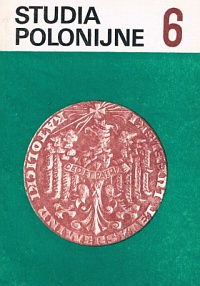Impact of the National and Historical Heritage on the Processes of Integration of the Polish Ethnic Group into the American Society
Main Article Content
Abstract
The author starts with presenting the most important data concerning the history of the Polish ethnic group in America. Then, he tries to explain what the process of integration is as distinct from the process of assimilation. Next, he discusses the elements of the national and historical heritage and its role in the process of integration.
What is common in the culture of all Poles and what makes them belong to the same nation. The article distinguishes five main elements: language, Catholic faith, tradition and social ties, national character and national consciousness. The problem of national character, its values and drawbacks, is discussed in detail. The author recalls that the Prussian chancellors of the 19th century (Hardenberg and Bismarck) called the Poles an extraordinary nation.
The world war I and the first post-war years were full of national feelings, patriotic zeal, and help for Poland and the States. The years 1913-1919 were the most glorious. Polonia had its army in France, its political representation in the form of the National Department which were recognized by the country of settlement as well as its own legislative authority.
Basing on the archival collection of the Polish Museum in Chicago, the author presents the effort of Polonia, the National Department and Ignacy Paderewski toward the problem of Polish independence. The National Department spent around 2 million dollars on the support of the Polish representative to the peace conference in France. More than 25 thousand volunteers joined the army of general Haller; millions of dollars were spent on the material help for starving and exhausting citizens of Poland.
Polonia was also engaged in work for the United States. Many Poles joined the American Army, took part in various loans and showed great loyalty to the States. All this contributed a lot to the integration of Polonia into the American society.
On the other hand, there were many factors delaying the process of integration which followed either from the Polish ethnic group itself or from the authorities and other dominant groups of the American society.
The author expresses his warm acknowledgements to professor Tadeusz Siedlik and the Foundation of Stanislaw Jasiukiewicz for the grant and assistance in collecting the archival materials.

